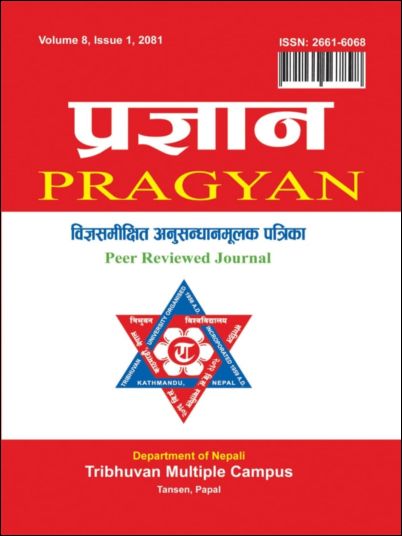महारानी उपन्यासमा शरीर राजनीति {Body Politics in the Maharani Novel}
DOI:
https://doi.org/10.3126/pragyan.v8i1.67676Keywords:
पितृसत्ता patriarchy, प्रभुत्व patriarchy, राष्ट्रिय अखण्डता national integrity, विनिर्मित exchange, शरीर राजनीति body politicAbstract
प्रस्तुत लेखमा चन्द्रप्रकाश बानियाँद्वारा रचित महारानी उपन्यासलाई शरीर राजनीतिसम्बन्धी सैद्धान्तिक आधारमा अध्ययन विश्लेषण गरिएको छ । शरीर राजनीति पाश्चात्य समालोचनाका क्षेत्रमा विकसित सांस्कृतिक अध्ययनका क्रममा आएको नवीन पद्धति हो । यसले जैविक शरीरको होइन महिला र पुरुषको विनिर्मित शरीरको अध्ययन गर्दछ । यस उपन्यासमा विद्यमान शरीर राजनीतिको पक्षलाई अध्ययनीय विषय बनाई प्रस्तुत लेख तयार गरिएको छ । कृतिको अर्थापनका लागि सघन पाठविश्लेषण विधिअनुसार सूक्ष्म पठन गरी स्थापित सिद्धान्तका आधारमा सन्दर्भपरक विश्लेषणसमेत गरेर परिणाम निकालिएकाले यो अध्ययन गुणात्मक प्रकृतिको छ । विवेच्य उपन्यासमा प्रस्तुत शरीर राजनीतिको विषयलाई मूल प्राज्ञिक समस्या बनाएर त्यसको समाधान खोज्न कृतिमा शक्ति र प्रभुत्वबाट भएको मानव शरीरको उपयोग तथा पितृसत्ताबाट भएको महिला शरीरको उपयोगको मात्र अध्ययन गरिएको छ । शक्ति र प्रभुत्वले गरेको शरीर राजनीतिमा महिला र पुरुष दुवैका शरीरको उपयोग भएको छ भने पितृसत्ताले गरेको शरीर राजनीतिमा महिला शरीरको अत्यन्त धेरै उपयोग भएको छ । यस उपन्यासमा सबैभन्दा बढी राजकुमारी विश्वप्रभा र राजकुमार भद्रिवमको शरीरको प्रयोग भएको छ भने युवराज मलेवम, महाराज घनश्याम, कमल जैसी, डिल्ली भुजेल, महलवसन्ता, गुलवदन, जयन्ती जस्ता पात्रहरूको शरीरको पनि उपयोग गरिएको छ । पितृसत्ताले गरेको शरीर राजनीतिमा महिला शरीर विशेष गरी विश्वप्रभाको शरीरको सबैभन्दा धेरै प्रयोग भएको छ । उनी राजोचित गुणले भरिपूर्ण भएर पनि राष्ट्रको अखण्डता तथा सत्तास्वार्थका नाममा पर्वत दरबारको षड्यन्त्रमा परी दुर्घटित जीवन भोग्न बाध्य पारिएकी छन् भने भद्रिवमलाई राज्य दिलाउने बहाना बनाएर जुम्लाराज्यले पर्वतराज्यको शक्ति छिन्नभिन्न पारी आफ्नो स्वार्थ सिद्धि गर्ने क्रममा उनको अल्पायुमै ज्यान गएको छ । समग्रमा प्रस्तुत उपन्यास शरीर राजनीतिका कोणबाट अध्ययनीय भएको निष्कर्ष प्राप्त भएको छ ।
{In the presented article, Maharani novel written by Chandra Prakash Baniya has been studied and analyzed on the theoretical basis of body politics. Body politics is a new method developed in the field of Western criticism during cultural studies. It studies the constructed bodies of men and women, not biological bodies. In this novel, the present article has been prepared by making the aspect of body politics a subject of study. This study is of a qualitative nature, as the result is derived from a detailed reading and contextual analysis based on established principles according to the intensive textual analysis method for the interpretation of the work. By making the subject of body politics presented in the critical novel an original academic problem, only the use of the human body caused by power and dominance and the use of the female body caused by patriarchy have been studied in the work to find its solution. In the body politics of power and dominance, the bodies of both men and women have been used, while in the body politics of patriarchy, women's bodies have been used a lot. In this novel, the bodies of Princess Vishwaprabha and Prince Bhadrivam have been used the most, while the bodies of characters like Yuvraj Malevam, Maharaj Ghanshyam, Kamal Jaisi, Dilli Bhujel, Mahalavasanta, Gulvadan, and Jayanti have also been used. Women's body, especially Vishwaprabha's body, has been used the most in patriarchy's body politics. Although she was full of royal qualities, she was forced to live a miserable life in the name of the integrity of the nation and the conspiracy of the mountain palace, while Jumla Rajya, using the pretext of giving Bhadrivam the kingdom, destroyed the power of the mountain kingdom and fulfilled its selfishness, she died in her early life. Overall, it has been concluded that the presented novel is studyable from the perspective of body politics.}




